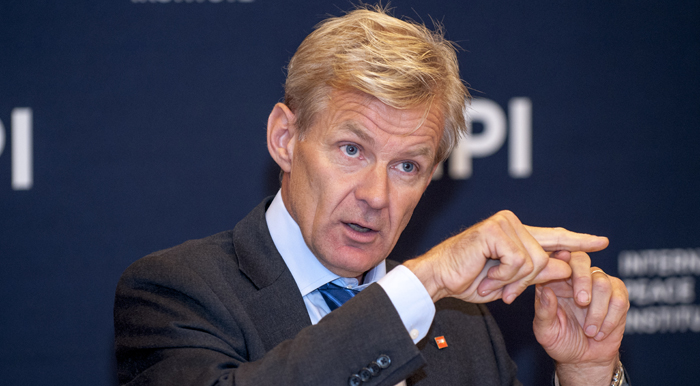
“What is material support to terrorism? Is it building a school that someone would potentially take over?”
These questions were posed by Jan Egeland, the Secretary-General of the Norwegian Refugee Council (NRC), and a former UN Undersecretary-General for Humanitarian Affairs, at an IPI panel event cosponsored by NRC and the Office for the Coordination of Humanitarian Affairs (OCHA).
The September 7th event was organized to discuss the findings of an independent study commissioned by NRC and OCHA in response to growing concern among humanitarian actors about some disturbing consequences of international and national counterterrorism measures on humanitarian action.
“It is a little bit toxic, the whole thing, and we need to detoxify it,” said Mr. Egeland. “And those that are most vulnerable, of course, are many of the Islamic groups.”
Another panelist, Kyung-wha Kang, the Assistant Secretary-General for Humanitarian Affairs and Deputy Relief Coordinator, outlined many of the ways in which counterterrorism legislation negatively affects humanitarian actors, including, she said, “halts or decrease in funding, blocking of projects, suspension of programs, planning or program design not according to needs, delays in project implementation, increased administrative procedures for procurement or vetting, and limitations on financial transactions.”
The reaction to counter-terrorism measures has also been characterized, in some cases, by risk aversion and self-censorship within humanitarian organizations. “Policies that inhibit—not prohibit—inhibit engagement and negotiation with armed groups” can nevertheless lead to such self-censorship, Ms. Kang said. Often because the policies are unclear on how exactly they will play out.
Mr. Egeland noted that in Gaza, “A group discontinued food distribution to two kindergartens because the headmaster was seen as leaning to Hamas,” he said. “So I’m asking you, when did a baby become a Hamas baby? A baby is a baby.” He then went on to explain why, in this case, an “unintended consequence” of the counterterrorism policies is doubly problematic. “And if I was a Hamas-leaning father,” he said, “having my children at a kindergarten that was not getting relief because the headmaster was seen to be Hamas [leaning], I would not become more moderate and more liberal—I would become very angry first and foremost. It is counter-productive.”
Both panelists stressed that the study was in no way intended to comment on the necessity by states to take measures to protect themselves against terrorism. The third panelist, Jean-Paul Laborde, Executive Director of the United Nations Counter-Terrorism Committee Executive Directorate (UNCTED), stressed that the impetus behind counterterrorism legislation is legitimate concerns for safety, and many Parliamentarians acted in response to their constituents’ concerns.
Mr. Egeland said that there have been many unintended consequences, however. “The Parliamentarians, the congress people, who initiated these general policies,” he said, “did not know that when they translated through ministries of treasury and interior or homeland defense or whatever, through a state department or donor down to the NGO, it had totally counter-productive effects.”
Augmenting the issue is the fact that many armed groups, including those designated as terrorist groups often arise in places in the greatest need of humanitarian assistance.
“The whole purpose of humanitarian work is to provide for the betrodden, the poor, the vulnerable, when there is war, when there is terror, when things are at their worst, irrespective of who is in control of the place,” said Mr. Egeland. “Because the whole purpose of humanitarian work is to reach the victims at the depths of hell,” he added, “you have to speak to the devil.”
Several solutions to the problem were discussed during the event. “National or international sanction regimes should provide for humanitarian ‘carve-outs,’” said Ms. Kang. “That is, exceptions within the regime providing for the delivery of humanitarian assistance to people in need.”
Mr. Laborde suggested a possible reform of Resolution 1373, a wide-ranging anti-terrorism measure that effectively criminalizes any financial support to any group designated as terrorists, to only seek legal action, “in connection with a crime of terrorism, not with terrorism in general, he said. “If there’s not intent to give these funds to these organizations to commit a crime of terrorism, they should not be prosecuted.”
Mr. Egeland stressed the need for humanitarian organizations to cross-pollinate safeguarding mechanisms and practices to guarantee aid does not funnel to armed groups. “Are you really sure that you’re checking, evaluating, auditing, monitoring, vetting, in all fashions so that you know your relief is not going into the wrong hands?” he said.
At the same time, it is imperative these organizations remain impartial. “We cannot ever act on behalf of any government or group whether North, South, East or West, Muslim, Christian, or whatever,” Mr. Egeland said.
All the panelists spoke on the need for communication and collaboration between organizations in the humanitarian and political and legal actors. “It will take some time but, we can make this new legislation with international humanitarian law exemptions,” said Mr. Laborde. “We should act together,” he added. “Otherwise it will not work.”
Read the Global Observatory interview with Jan Egeland>>
Watch event:







